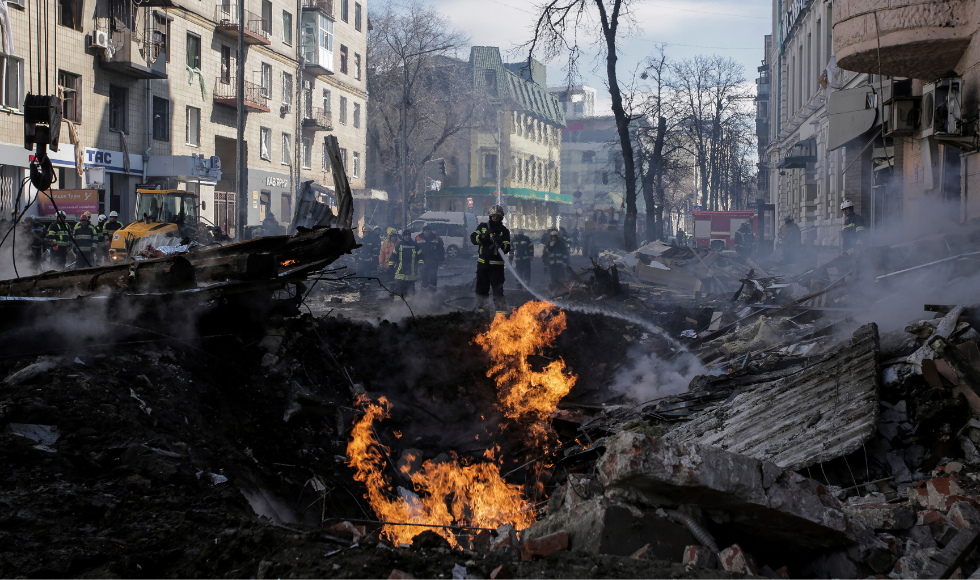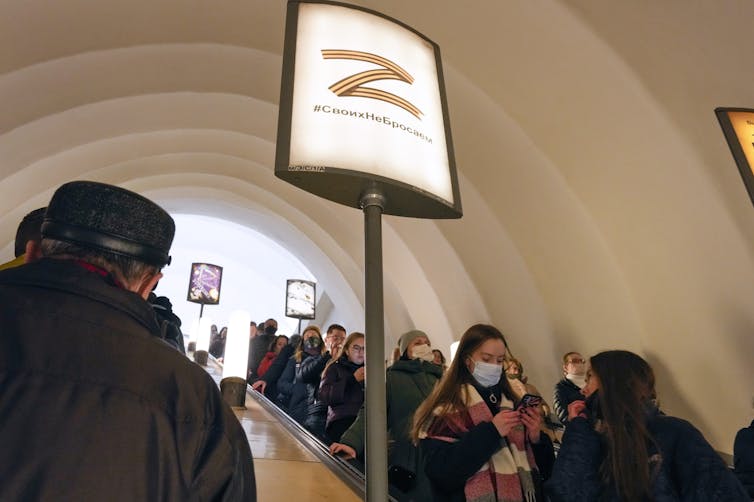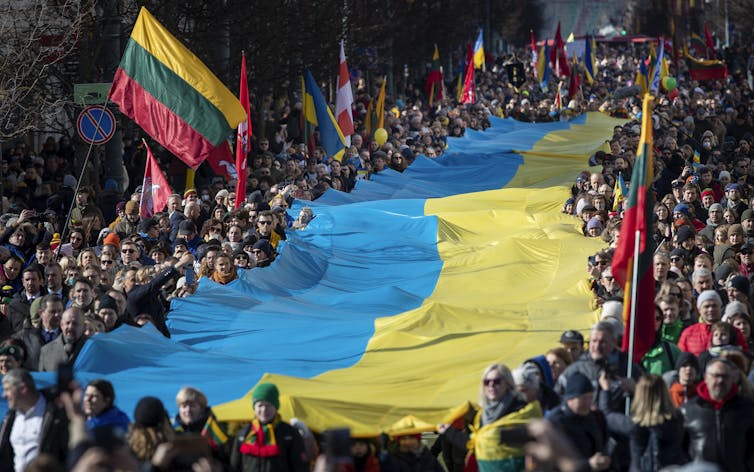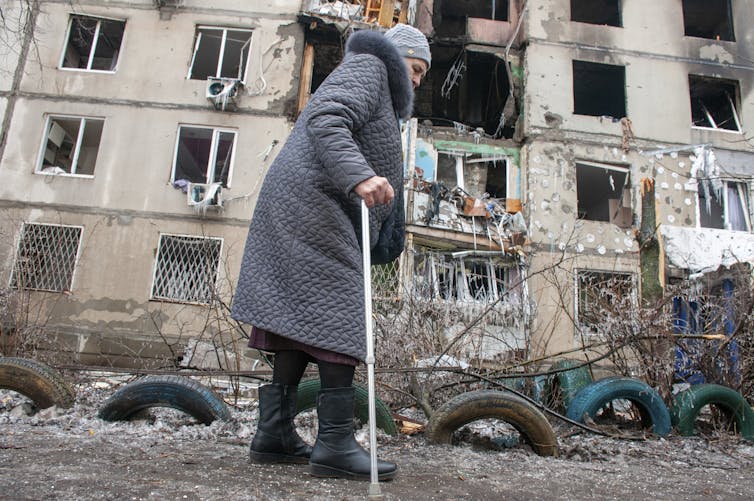Analysis: The Russian diaspora isn’t showing much support for Russia’s invasion of Ukraine

Firefighters extinguish a fire at a destroyed apartment complex after a Russian rocket attack in Kharkiv, Ukraine’s second-largest city, on March 14, 2022. The majority of the city’s residents are Russian-speaking. (AP Photo/Pavel Dorogoy)
BY Vic Satzewich, Professor of Sociology
March 17, 2022
Members of diaspora communities often mobilize to provide support to their ancestral homeland during a crisis. While the Russian invasion of Ukraine is a crisis for Ukrainians, it’s also a crisis for Russia, and thousands have been detained for protesting the war.
But where is the Russian diaspora’s support for Russia in its time of crisis?
Diaspora support during crises includes sending money to families and friends back home, financial aid to charitable organizations and business investment.
It can also include the creation and reproduction of narratives to explain the crisis and provide reasons to care about what is happening in the ancestral homeland.
Those narratives also factor into diaspora lobbying to shape foreign policy in the country of settlement toward the ancestral homeland. Likewise, countries in the midst of a crisis often turn to their diaspora to solicit support.
Russia in crisis
Though rockets are not raining down on Russian cities and civilians, Russia is in crisis. Sanctions are affecting the lives of everyday Russians, anti-war protesters are being criminalized, independent media are shuttered and much of the world today considers Russia a pariah state.
Russian authorities continue to justify the invasion of Ukraine by promoting two bogus interrelated victim narratives. First, Russia says it’s protecting Russians who live in Ukraine from genocide by “neo-Nazis and drug addicts.”
Second, it says it’s facing a security threat from NATO after its expansion into the former Soviet republics of Latvia, Lithuania and Estonia and its potential expansion into Ukraine.
The Russian government, like many other governments around the world, has a diaspora engagement strategy that’s institutionalized, in part, through the Russkiy Mir (Russian World) Foundation.
Initiated by presidential decree in 2007, one of the central aims of the foundation is to “reconnect … the Russian community abroad with their homeland, forging new and stronger links through cultural and social programs, exchanges and assistance in relocation.”
Russkiy Mir also acts as a mouthpiece to justify Russia’s war with Ukraine by reproducing the Kremlin’s victim narrative.

Diasporas don’t speak with one voice
But diasporas aren’t homogenous. They don’t speak with one voice about crises in their homelands. While some people and organizations within the Russian diaspora may support the war in Ukraine, many seem unwilling to publicly defend Russia’s war in Ukraine.
Part of the reason why Russia’s diaspora mobilization strategy amid the Ukraine war seems to be bearing so little fruit is that the Russian diaspora is based mostly on a common language with an ambiguous connection to the Russian state.
The Russian diaspora is actually made up of three quite different strands of people — Russians who live in former Soviet republics, Russians who have immigrated to the West from those republics and Russians who have left Russia since the collapse of the Soviet Union. None of them seem to be publicly mobilizing to support Russia.
Russians who currently live in former Soviet Republics are a diaspora not because of migration, but because they are a stranded minority who were, in a sense, “left behind” after the breakup of the Soviet Union.
It’s not clear how Russians in countries like Latvia, Estonia and Lithuania feel about the Russian invasion of Ukraine.
But a 2021 report suggests the Russian diaspora in the Baltic states may not be the Trojan Horse the Russian state hopes it would be. Massive protests against the Ukraine invasion in former Soviet republics suggest as much.

Nervousness in former Soviet republics
There is undoubtedly some concern among Russians in these states that Putin’s forces might ostensibly come to their “rescue” next.
Russian-speaking Ukrainian men, women and youth are not welcoming the Russian soldiers with bread and salt, the traditional Ukrainian greeting of hospitality. Instead, they can be seen standing in front of Russian armoured vehicles trying to block their progress and hurling obscenities in Russian at Russian soldiers.
This must create at least some alarm for the global Russian diaspora.
So should indiscriminate Russian mortar attacks on civilian targets in many cities in Ukraine that have large Russian-speaking populations.

Russians abroad
Russians who have migrated to the West from former Soviet republics are ethnically and religiously diverse. In communities that include Russian Jews, Uzbeks, Georgians, Ukrainians and others, support for Ukraine seems nearly universal.
Many post-1991 emigrants from Ukraine to the West, for example, are Russian-speakers but nonetheless identify as Ukrainian and with the Ukrainian diaspora. Russian and Ukrainian speakers also pray together at the same churches.
Russians who have left Russia since the dissolution of the Soviet Union may number as high as five million since Vladimir Putin came to power.

Most are well-educated younger people who have moved to North America, the European Union and elsewhere. They include high-profile sports figures like NHL star Alexander Ovechkin and some Russian oligarchs and their children who have extensive property holdings in the West and multiple citizenships. They’re beneficiaries of “golden passports” that provide residency and citizenship to those who purchase them.
Feeling the pinch of sanctions, at least some of the wealthy Russians who live abroad are willing to speak up and distance themselves from the Putin regime. One Russian businessman in the United States reportedly offered a US$1 million bounty to anyone who was willing to help arrest Putin and put him on trial as a war criminal.
‘Shocked, saddened and dismayed’
Ordinary members of the Russian diaspora community are more circumspect.
The Congress of Russian Americans is mainly concerned about the “prejudices and retaliations” faced by Russians in the U.S. The organization said it’s “shocked, saddened and dismayed” by recent tragic events in Ukraine, and it’s been reluctant to reproduce Kremlin-sponsored victim narratives.
But it’s also muted in its criticism of the Putin regime. It’s not clear whether its silence implies support for Russia’s actions and narratives, or whether it’s also fearful of Russian retribution.
The Kremlin does not take kindly, and is not above poisoning, diaspora dissidents like Alexander Litvinenko and Sergei and Yulia Skripal.
Russkiy Mir insists that the Russian language is not one of “hatred, enmity, xenophobia or isolationism,” but Russian rockets are sending a different message to its diaspora — and to the world.![]()
Vic Satzewich, Professor of Sociology, McMaster University. This article is republished from The Conversation under a Creative Commons license. Read the original article.


